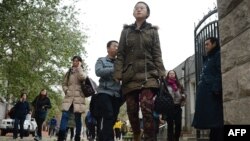Chinese national Cherry He Ting rattles off in fluent Thai as she presents her masters thesis ahead of graduating from a Bangkok university, where she has studied for the past three and a half years.
The 28-year-old history student is among thousands of Chinese who join Thai universities every year, according to Thai government data, which shows their annual enrollment numbers have doubled since 2012.
Hit by years of declining enrollment of Thai students, the institutions are scrambling to meet this recent surge in demand as Chinese students look for alternatives to Western schools.
Chada Triamvithaya, an academic at King Mongkut's Institute of Technology Ladkrabang who has been researching Chinese migration patterns in Thailand, said universities currently make twice the amount in tuition fees from Chinese students as they do from locals.
"Apart from private universities, state universities, even one for Buddhist monks, are now creating courses aimed at attracting Chinese students. It is all about the money," she said, adding that the lure of rising Chinese demand in Thai education has already attracted Chinese investment into the sector.
Thai universities offer more affordable overseas study for Chinese students, compared with more popular destinations like Australia, the United States and Britain, Diane Hu, assistant professor at Beijing Foreign Studies University told Reuters.
Many of these Chinese students come from the largely rural, southern provinces, hoping to escape a highly competitive but poor education system back home and land well-paying jobs in Southeast Asia's second biggest economy.
"Further interest in southern provinces can be attributed to heightened trade ties between the two countries and Belt and Road-driven initiatives," Diane said.
China's Belt and Road program promotes expanding land and sea links between Asia, Africa and Europe, with billions of dollars pledged for infrastructure development.
Chinese students say Thailand offers better prospects because of lower tuition fees and friendlier visa rules than in the West.
Studying for an undergraduate business degree costs up to 120,000 baht ($3,700) a year in Thailand, while tuition fees for a similar course can range from $8,000 in Singapore to over $60,000 a year at some U.S. universities.
Chinese students are also facing greater scrutiny in countries like the United States, where the Trump administration is considering new background checks and other restrictions over growing espionage concerns.
"If I work here I will have more opportunities than where I came from," said Cherry, who first arrived in Chiang Rai in northern Thailand almost eight years ago as an exchange student.
She said she arrived by boat on the Mekong River from her hometown of Jinghong in southern China. She first studied tourism management at a university in Bangkok before doing a master degree in history at another university.
As many as 8,455 Chinese students enrolled in Thai universities in 2017, twice that in 2012. The total is as high as 30,000 across the country, according to research by the Asia Research Center for Migration at Chualongkorn University.
'Soft Power'
Thai universities rank well below those in neighbors like Singapore and Malaysia, according to the Times Higher Education World University Ranking, Both those countries have schools among Asia's top 50 whereas Thailand's top institution, Mahidol University, has slipped nearly 30 places in recent years to rank near 100 out of 400 schools across Asia.
Chinese demand has risen in spite of this, and both private and state universities now hope that rising foreign enrollment will help bring in more revenue and improve the quality of education.
"Chinese students are part of the soft power assertion of China into Thailand," said Chada at King Mongkut's Institute of Technology, adding the rising number of students has been followed by a rise in Chinese teachers, translators, and academics getting more jobs in the Thai education sector.
Woraphong Dechasasawat, the vice president of one of the country's largest Chinese-language business schools, says the institution aims to find students from among the roughly three million Chinese who would struggle to find university placement back home each year.
"There will always be demand when you talk about China, it is about how ready are we in adapting to it," he said.
Part of Dhurakij Pundit, one of the country's largest private universities, the school started with 23 Chinese students in 2010 and now hosts about 3,700.
Some Chinese investors have even invested in private universities like Bangkok's Krirk university, with plans to introduce more courses aimed at the Chinese market, according to media.
Many researchers believe this trend will continue as China looks to expand its influence across Southeast Asia and beyond.
"The Belt and Road initiative has led to more Chinese students going to study along its corridors in the past year through government scholarships," Aksornsri Phanishsarn, an economist at Thammasat University told Reuters.
"But Thailand has seen its own surge as well due to large trade and tourism between the two countries," said Aksornsri.





